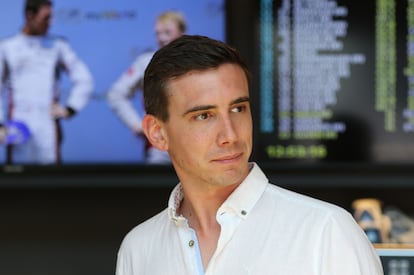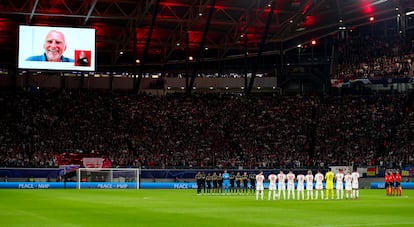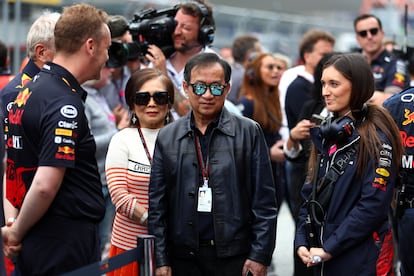Mark Mateschitz, the uncertain heir to the $25 billion throne of Red Bull
The 30-year-old son of Didi Mateschitz, who co-founded the brand in the 1980s with a Thai entrepreneur, could be successor to the empire, but the decision rests with a family whose eldest son is a fugitive from justice

When the legendary and charismatic Red Bull boss, Dietrich Didi Mateschitz, died of pancreatic cancer on October 23, the whole of Austria was shocked. Next, they asked who would be taking over the energy drink empire. His son Mark? The fugitive heir to the Thai co-founder of the famous brand? Or perhaps a faceless executive?
In Austria, Didi Mateschitz’s son Mark has always been considered a possible successor, but although he will inherit a considerable fortune estimated at around €25 billion, it is uncertain whether he will be able to follow in his father’s footsteps. The reason is that this decision depends on the powerful Thai family who helped create the company, and whose fortune is estimated at more than €26.6 billion, the second biggest in Asia, according to Forbes magazine.
Mark, now 30, kept a low profile during his childhood and teenage years, growing up with his mother’s surname. But after finishing his degree in business administration, the young man began to use his father’s surname and appeared in senior positions in Red Bull companies. As a child, only his middle name, Dietrich, suggested a link with the prominent Red Bull co-founder, and many thought he would grow up safe from the spotlight. Photos of him are scarce and interviews even more so. According to some reports in the Austrian newspaper Kurier, his classmates have described him as “bright and sports-oriented, with many interests.”
Since the beginning of 2022, Mateschitz junior has been on the board of the Red Bull Wings for Life Foundation, run chiefly by his mother, Anita Gerhardter. He has also been CEO of the soft drinks, water and beer company Thalheimer Heilwasser GmbH for almost four years; and in 2021, he became head of the Salzburg-based management company Mark Mateschitz Beteiligungs GmbH, which owns 34% of Taurea, another company that, in turn, controls a number of properties that are part of the Red Bull empire.

Although his father’s long and fatal illness came to public attention several months before his death at the age of 78, no one in the company had commented on who might step into his shoes. Who would come after the man who had the brilliant idea of importing a magic drink from Thailand that he first tasted in a Bangkok hotel bar when he was an executive of a German company?
To date, Mark Mateschitz has not said a word about his future in the company that his father co-created. The decision as to whether he will be involved in Red Bull’s future is not his: it will be taken by the Yoovidhya family, the company’s main shareholder. When he co-founded Red Bull in the 1980s, Mateschitz took 49% of the business. Another 49% went to Chaleo Yoovidhya, inventor of the initial energizing concoction Krating Daeng, which was the inspiration for Red Bull. The remaining 2% went to Chalerm, Yoovidhya’s first-born son. After his father’s death in 2012, Chalerm controlled 51% of the company’s shares, which gives him executive power.
But Chalerm, who is now 72, has a problem: for the past 10 years his heir, Vorayuth, has been on the run from Interpol for a hit-and-run incident involving the death of a police officer. It was September 2012 and the young man was 27 when, under the influence of alcohol and cocaine, he hit Sergeant Wichien Klanprasert with his gray Ferrari. The officer was on a motorcycle, investigating a robbery. When Vorayuth Yoovidhya hit him, Klanprasert was dragged 100 meters and died immediately. He was 45. Vorayuth fled the scene and his father subsequently paid $100,000 in compensation to the policeman’s family. However, Interpol has not given up the chase, which makes it hard for Vorayuth to succeed the famous Didi Mateschitz, though the Thai clan will have the last word.

How it all began
It was the 1980s when the seeds of Red Bull were sown. After an exhausting trip to Thailand, Didi Mateschitz asked the waiter for a drink to help him fight jet lag. He was served a glass full of Krating Daeng, a local concoction used by truck drivers to stay awake on their long journeys and which would translate as “red water buffalo” in English. After drinking the contents of the glass, Mateschitz was intrigued by the sudden feeling of well-being flooding his previously exhausted limbs.
As well as having a miraculously refreshing effect on Mateschitz, the drink gave him an idea for a business initiative, along the lines of: This could be a good thing for Europe, where there are so many stressed-out executives and so many young people hungry for fun. After obtaining a license to produce the drink in Austria in 1984, Mateschitz resigned from his position at Blendax – the multinational toothpaste and hygiene products company where he worked – and sunk his life savings into founding Red Bull GmbH together with two Thai partners.
At first he was terrified, though he viewed it as an existential challenge. “There is no market for Red Bull, but we will create one,” he said at the time. His break came when an advertising friend told him that he had created the ideal slogan for his drink: “Red Bull gives you wings.” In 1987, the first cans began to be sold and the company took off, with growth rates approaching 200% a year. Its 2013 figures speak for themselves: 5.3 billion cans sold in 166 countries and a turnover of more than €5 billion. By 2021, Red Bull had sold 10 billion cans.
Many analysts have tried to decipher the secret of Red Bull’s incredible success and almost all have concluded that Dieter Mateschitz was a genius when it came to promoting and marketing his magic drink, which energizes the muscles and brain and reactivates the heart. But its effects are not the only secret of its success. Thanks to his slogan, “Red Bull gives you wings” – which would later cost him a lawsuit for false advertising – the Austrian entrepreneur managed to suggest a different approach to life and its challenges. He made Red Bull synonymous with freedom and independence, and suggested that one sip awakens the desire to succeed. In other words, he equated it with success. Who will take the reins of his legacy, and whether they will be able to keep the company at the top of its game, is the million-dollar question that is yet to be answered.
Tu suscripción se está usando en otro dispositivo
¿Quieres añadir otro usuario a tu suscripción?
Si continúas leyendo en este dispositivo, no se podrá leer en el otro.
FlechaTu suscripción se está usando en otro dispositivo y solo puedes acceder a EL PAÍS desde un dispositivo a la vez.
Si quieres compartir tu cuenta, cambia tu suscripción a la modalidad Premium, así podrás añadir otro usuario. Cada uno accederá con su propia cuenta de email, lo que os permitirá personalizar vuestra experiencia en EL PAÍS.
¿Tienes una suscripción de empresa? Accede aquí para contratar más cuentas.
En el caso de no saber quién está usando tu cuenta, te recomendamos cambiar tu contraseña aquí.
Si decides continuar compartiendo tu cuenta, este mensaje se mostrará en tu dispositivo y en el de la otra persona que está usando tu cuenta de forma indefinida, afectando a tu experiencia de lectura. Puedes consultar aquí los términos y condiciones de la suscripción digital.








































